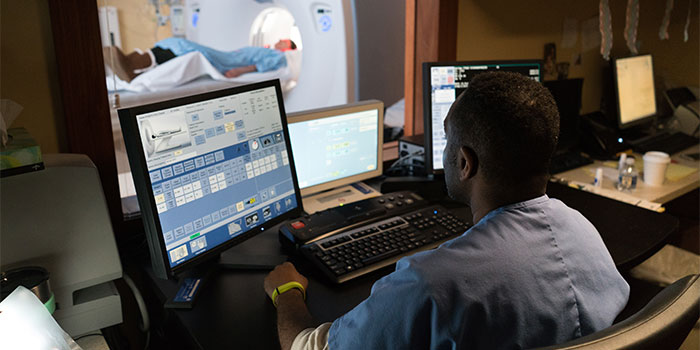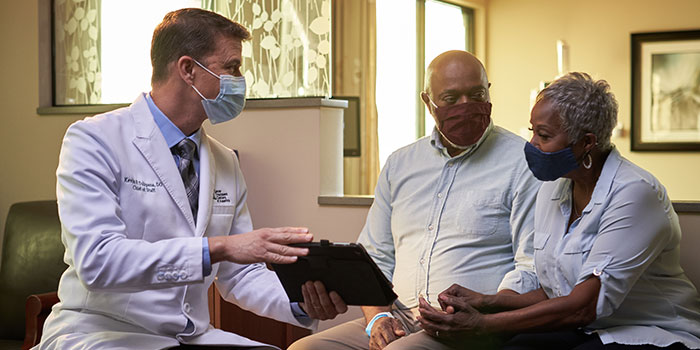
Treatments for advanced cancer have significantly improved over the years. New treatments, including immunotherapy and targeted therapies, are available to some patients, and the means of delivering other treatments, such as chemotherapy, radiation and surgery, have improved as well. Supportive care therapies may help patients manage side effects and improve their quality of life during and after treatment.
Even so, treatment for advanced cancer is often complicated, and patients may face difficult decisions about their cancer care. Some patients are diagnosed with cancer that’s already at an advanced stage. Some patients find their cancer continues to advance despite treatment. Depending on the type of cancer they have, how it’s progressing and their response to the treatments they’ve had so far, some experience a variety of symptoms or side effects, while others experience very few.
It may be daunting to be diagnosed with advanced cancer, or to find that your, or your loved ones, cancer has progressed. If you're in this situation, you may have a lot of questions, such as:
- What do we do next?
- What are the chances I’ll respond to another treatment?
- If another treatment is available, what side effects should I expect?
- Can I take some time off from treatment?
- How long can I live with advanced cancer?
Each patient’s situation is unique, and you’ll need to discuss your options with your doctor. But, depending on your clinical situation, there may be additional treatments for advanced cancer available to you. To help you navigate treatment for advanced cancer, this article provides information about:
- What is advanced cancer?
- Advanced cancer treatment goals
- Treatment options for advanced cancer
- Questions to ask your oncologist about cancer treatment options
- Where you find advanced cancer treatment centers?
If you’re interested in learning about treatment options for advanced cancer, or if you’d like to get a second opinion at one of our locations, call us or chat online with a member of our team.
What is advanced cancer?
“Advanced cancer” is an ambiguous term. The National Cancer Institute defines advanced cancer as “cancer that is unlikely to be cured or controlled with treatment.” Patients and doctors often use the term to describe cancer that’s progressed beyond its first stages. Advanced cancer may describe cancer that’s continued to grow despite treatment, spread to other parts of the body (called metastasis), caused secondary tumors or recurred after a period of remission. In these situations, the cancer may have advanced after standard treatment options, or conventional lines of therapy, have already been used. Other patients with advanced cancer may not require initial treatment for an extended period of time.
Some patients, however, may be initially diagnosed with what’s considered advanced cancer. This may include cancers that are considered to be stage 3 or stage 4 cancer at the initial diagnosis or when there’s evidence that the cancer cells have already spread to other parts of the body before diagnosis.
Advanced cancer symptoms
Some patients with advanced cancer may have very few symptoms and feel relatively well despite the progression of their cancer, while others may have symptoms that significantly affect their quality of life. It often depends on the type of cancer a patient has. Patients with indolent (slow-growing) non-Hodgkin lymphoma, for example, may have very few symptoms despite having cancer in several areas of their body, and may not actually need immediate treatment. Others with less clinically advanced cancer may be experiencing significant side effects and feel quite sick.
How a patient feels physically and is coping with his or her situation may be as important as his or her clinical status.
Advanced cancer treatment goals
The goals of each cancer patient’s treatment plan are as unique as each cancer patient. In general, the objectives of further treatment for advanced cancer may include stemming the advance of the disease, managing symptoms of the cancer and the side effects of treatment, and making living with those symptoms more tolerable.
Treatments continue to evolve, and innovative treatment advances may allow some cancers to be managed more like chronic health conditions. Chronic myeloid leukemia (CML), for example, may now commonly be managed with oral tyrosine kinase inhibitor (TKI) therapy, rather than a bone marrow transplant, which used to be the standard first-line treatment. We’re finding that, in a certain subset of patients, immunotherapy treatments may control their advanced cancer on a long-term basis. Some are even able to discontinue therapy for a period of time without their disease progressing.
However, finding a balance between slowing the progress of the disease, reducing symptoms and dealing with the potential side effects of cancer treatment may be key to making decisions about treating advanced cancer. Sometimes, patients want to take a break from treatment for personal reasons. Others want to continue trying new treatments. No patient is required to undergo treatment unless they choose to.
It’s important to discuss your goals with your care team and to weigh how further treatment may affect your quality of life versus how that treatment may hold back the cancer’s progression. This may be an ongoing conversation, and, as the patient, you have the right to change your mind about a chosen treatment path. You may consult your health care provider at any time about options for different treatments that may have fewer side effects.
Treatment options for advanced cancer

The need for multidisciplinary care is common when treating advanced cancer. Patients often require a combination of types of treatment. A patient with locally advanced breast cancer, for example, may need chemotherapy before surgery to try to reduce the size of a tumor. This may make surgery easier and may also allow the surgeon to perform a lumpectomy to preserve part of the breast rather than a total mastectomy. After surgery, the patient may need radiation therapy, additional chemotherapy or hormonal therapy—or even some combination of these treatments.
Doctors also have to carefully consider whether a patient can tolerate a new treatment regimen. Patients with advanced cancer sometimes have comorbidities, such as diabetes, high blood pressure or heart disease. They may be experiencing long-term side effects of their cancer or of previous treatments that complicate their options.
Your care team will examine these factors and to create a customized treatment plan according to your clinical needs. Your team of care providers may include experts in treating the cancer itself and those skilled in helping patients manage the side effects of cancer and its treatment.
The following isn’t a comprehensive look at the types of treatment for advanced cancer, but these treatments are commonly used alone or in combination to attempt to manage advanced cancer and/or improve patients’ quality of life. You’ll need to discuss your specific options with your care team.
Chemotherapy for advanced cancer
Chemotherapy is one of the most commonly used treatments for advanced cancer. It may also be used for symptom relief. A combination of chemotherapy drugs may be used, or chemotherapy may be combined with other treatments as part of a broader treatment plan.
In addition to being administered through infusion (an intravenous drip), some chemotherapies are now available in oral/liquid or pill form, by injection or through a topical cream. Patients can even take some oral chemotherapies at home. A specially trained oncology nurse may be able to come to qualified patients’ homes to administer chemotherapy or immunotherapy infusion or injections.
Radiation therapy for advanced cancer
Radiation therapy may be used as a primary treatment alone or in combination with other treatments to attempt to kill or slow the growth of cancer cells and to shrink tumors.
For patients with advanced cancer, radiation may also be used to alleviate pain. A patient with metastatic prostate cancer, for example, may experience bone pain if a tumor is pressing on the spinal cord. Radiation aimed at the tumor may relieve that pressure and reduce the pain.
Improvements in technology allow radiation oncologists to deliver a more precise dose of external beam radiation to cancerous tissues with sophisticated equipment designed to spare healthy tissue. This more precise delivery may reduce the toxicities and side effects of radiation therapy. Internal radiation therapy allows radiation to be delivered in appropriate doses using a catheter or a device implanted inside or near a tumor. This method often only requires a few treatments versus weeks of traditional radiation therapy.
Surgery for advanced cancer
Surgery may be a first line of treatment after a cancer diagnosis, but it may also be a treatment option for advanced cancer. Surgery may be used in combination with other treatments, as in the previous example of advanced localized breast cancer. Surgery may also be used to remove tumors or obstructions that are causing pain. This palliative surgery may improve patients’ quality of life.
Immunotherapy for advanced cancer
Immunotherapy is an innovative type of precision medicine that stimulates the body’s immune system to fight cancer cells, which the body has failed to recognize as a threat.
Immunotherapy is one of the more promising treatments for advanced cancer in patients whose cancer meets certain criteria. Take lung cancer, for example. Patients diagnosed with advanced lung cancer previously had few treatment options and a limited prognosis. Since 2015, the U.S. Food & Drug Administration has approved several classes of immunotherapy drugs for advanced lung cancer that exhibits certain genomic mutations. Some patients receiving this therapy are living for years, and—for reasons we don’t understand yet—a few have been able to stop treatment and continue to do well.
Immunotherapy treatments may include checkpoint inhibitors, specific vaccines, monoclonal antibodies and cytokines. It’s sometimes used in combination with other cancer treatments, and may be used long-term to keep advanced cancer in check.
Targeted therapies for advanced cancer
Targeted therapies, including immunotherapy, act on specific characteristics of the cancer that are driving its growth—characteristics like proteins, receptors, hormones or genetic mutations. These drugs are often designed to prevent further proliferation of the cancer rather than directly killing the cancer cells.
Genetic and advanced genomic testing may identify whether your cancer exhibits any of these characteristics, and if so, which targeted therapies or other treatments may be best suited to you. With these targeted therapies, instead of treating cancer by the location of its origin, we’re able to use therapies known to be successful in combating those specific mutations. For example, a patient with breast cancer may have a mutation that’s also been found in colorectal cancer. If a targeted therapy has been shown to work against that mutation in colorectal cancer, the breast cancer patient may benefit from the same treatment.
Targeted therapies for advanced cancer treatment include monoclonal antibodies, hormone therapy and small molecule drugs.
Clinical trials for advanced cancer
Cancer clinical trials study the safety and effectiveness of new and experimental treatments, drugs and technologies for cancer treatment. New treatments require trials before the government approves them for general use in cancer treatment. While trials are underway, patients undergo the newly proposed treatments, which may offer patients with advanced cancer new treatment options that would otherwise not be available to them.
Ask your care team if you're interested in exploring whether you may be a candidate for a clinical trial. City of Hope, for example, is one of the largest contributors to the Targeted Agent and Profiling Utilization Registration (TAPUR) study in the United States. The study's aim is to improve our understanding of how commercially available anti-cancer drugs perform on a broader range of cancers, by matching the drugs to tumors with specific genomic mutations that the drugs are designed to target.
Not every patient with advanced cancer is a candidate for a clinical trial. You may have to have a particular type, or subtype, of cancer, be within a specific age range, have a cancer that exhibits a specific genomic mutation and/or have exhausted all other treatment options—in addition to a number of other trial-specific criteria. It’s worth asking your oncologist about, however, especially if your doctor tells you he or she is out of standard treatment options to recommend to you. You and/or your doctor can also search for clinical trials on the ClinicalTrials.gov database.
Supportive care therapies for advanced cancer
Treatment for advanced cancer may be challenging for both cancer patients and their loved ones due to the effects of the cancer’s progression and side effects of treatment. Supportive care, also known as palliative care, includes a range of therapies designed to improve patients’ quality of life before, during and after conventional cancer treatment.
Some patients mistakenly associate the term “palliative care” with end-of-life or hospice care. In fact, though, this care may benefit cancer patients at any stage of treatment, regardless of their prognosis. Early access to supportive care therapies may prevent or reduce some side effects at the outset.
Supportive care therapies may also be referred to as integrative care to reflect a unique approach to cancer treatment: using conventional treatments to attack the disease and evidence-informed therapies to prevent or manage cancer-related side effects that may impact quality of life. Types of supportive care therapies include:
- Behavioral health
- Oncology rehabilitation
- Nutritional support
- Pain management
- Spiritual support
- Naturopathic support
Of course, palliative care may also be used during end-of-life care—making patients as comfortable as possible when there are no more treatment options available or when patients have chosen not to pursue further cancer treatment.
Questions to ask your oncologist about cancer treatment options

There are a number of factors to consider before embarking on a new course of treatment for advanced cancer. You may want to know more about the impact of further treatment on your quality of life and what kind of an outcome you may expect. Weighing the benefits of treatment against potential negative effects may be key to making a well-informed decision about your next move. Before deciding on additional treatment, it may be helpful to ask your oncologist the following questions:
- What are we trying to achieve with this treatment?
- What can I realistically expect as a response to this treatment?
- What can I expect in terms of tolerance?
- What are the potential side effects? Are they reversible?
- Is supportive care available to help with side effects?
- How long should I expect to be on this cancer treatment?
- Am I eligible for any clinical trials?
If you know your cancer hasn’t been responding to treatment, ask your doctor if there’s an expert on your type of cancer that he or she can consult. Doctors can look at published research to locate others studying a particular cancer or treatment.
Getting the opinion of a tumor board about your case is another source of additional information. Tumor boards consist of pathologists, oncologists and other health care providers who treat cancer. They provide a fresh look at the specifics of a patient’s case. A tumor board may recommend additional testing or suggest treatment options your doctor hadn’t previously considered. Even if your local hospital doesn’t normally have access to a tumor board, virtual tumor boards are an option in many cases. Ask your doctor if he or she has or can consult a tumor board about your case.
When it comes to questions, no question about oncology is a dumb question. Don’t be afraid to ask your oncologist questions. Cancer is one of the most serious events of your life. You deserve to have your questions answered.
Where can you find advanced cancer treatment centers?
Depending on the treatment you and your doctor decide upon, you may be able to continue to receive treatment at your current treatment center.
If your situation is more complex, or if advanced treatment options aren’t available near you, you may benefit from seeking treatment at a larger cancer center or a research hospital where access to multidisciplinary, innovative care is available. Getting a second opinion is a common way to investigate this possibility.
A second opinion allows you to find out what another doctor or care team thinks of your case and how they would approach treatment. A larger cancer center may have access to advanced diagnostics, such as genetic and genomic testing, that may reveal a targeted therapy treatment match or some other treatment option that isn’t available where you’re currently being treated. These centers are also more likely to participate in clinical trials. Or maybe they also provide supportive care therapies to help improve your quality of life during treatment.
Cancer research continues to yield new data, promising new oncology drugs and innovative treatments. Many treatment options available to patients now weren’t possible even a few years ago. The result is improvements in treatment, care and patient quality of life.
If you’re interested in getting a second opinion, or if you’d just like to talk with someone at about treatment options for advanced cancer, call us or chat online with a member of our team.



